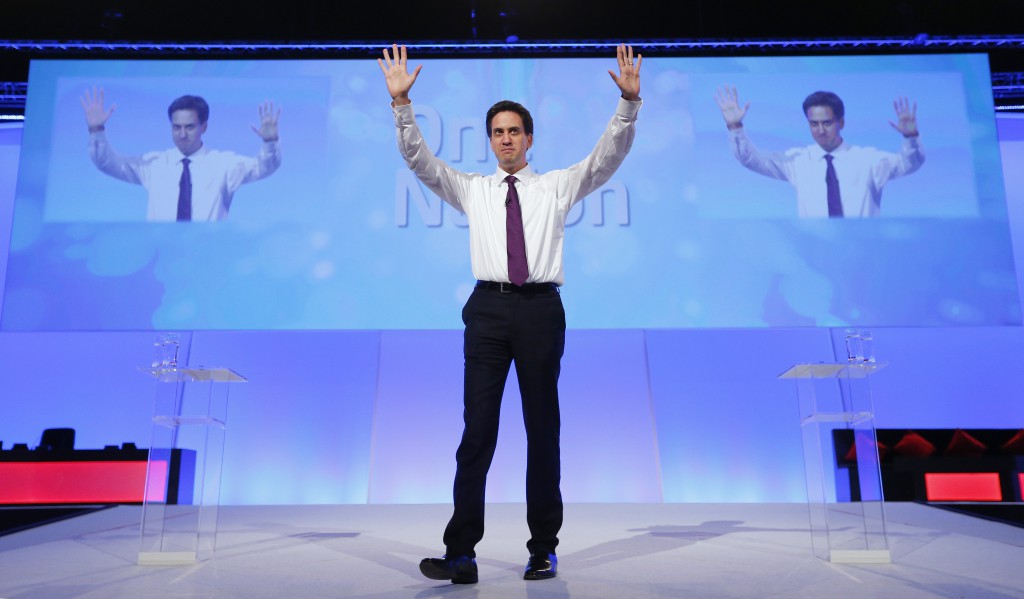
The Labour Party Leader Ed Miliband’s admission that there will be no Labour-SNP coalition in the event of a hung Parliament can be put down as a win for the Tories; they have succeeded in changing the focus of the general election debate.
The Conservative’s “scare-mongering” reflects a desire within the party to tap into the feelings of betrayal still felt by English voters following the Scottish independence referendum, where 44.7% of Scots voted to leave the union, compared to 55.3% who voted to stay.
Managing to successfully persuade voters to go from ‘don’t vote Labour if you want a Conservative government’, to ‘don’t vote Labour, as you risk getting the Scottish National Party too’, can be interpreted as being a fool-proof way of heading off a Labour majority, in the face of polls which do not paint a positive picture for the Conservatives. As of the 21st of March, The Independent and The New Statesman’s ‘Poll of Polls’ has Labour ahead on 33.8% – 0.6 points ahead of the Conservatives. Hence the release of the Tory-commissioned election poster, made by M&C Saatchi, depicting Ed Miliband in the pocket of Alex Salmond – a man who is no longer the SNP leader, but whose image is an embodiment of the distrust and disloyalty that English voters feel towards the SNP and which the Conservatives are trying to capitalise on.

The M&C Saatchi Image
With this in mind, it may not be wise for Ed Miliband to distance himself from the SNP so early on – especially when it looks likely that the two parties will be working together, though not in the guise envisioned by the Tories. Going on the polls alone, the Tories rhetoric does make sense – the Survation/Daily Record poll has the SNP up two points in Scotland and on 47%, whilst Labour is down one point to 26% – a 21% advantage. However, what is more likely to happen, as confirmed by First Minister Nicola Sturgeon, is that the parties could still reach an informal arrangement to “keep the Tories out of power”, by “support[ing] a minority Labour government on an issue-by-issue basis” – known as a “confidence and supply” agreement, whereby one party agrees to sustain another in office and back its budget, in return for concessions.
This is an altogether different arrangement than going into coalition with the SNP. However, to many voters it may still feel like a Labour-SNP partnership by another name. Honesty and trust are prized values amongst the electorate and where the Conservatives have succeeded, has been in being able to paint the Labour party as dishonest and untrustworthy – accusations that under Ed Miliband, the party have never been able to shake off. It is one thing to say that the party cannot be trusted with the UK economy, however it is an entirely different thing to say that Ed Miliband and his party cannot be trusted to simply keep the UK together and united (as David Cameron himself knows).
These are the accusations that the Labour leader could leave himself open to by pushing away the SNP now – a party, who according to the Prime Minister “want to break up our country” – only to call on them later in government.
‘Changing the focus of the debate.’
The Labour Party Leader Ed Miliband’s admission that there will be no Labour-SNP coalition in the event of a hung Parliament can be put down as a win for the Tories; they have succeeded in changing the focus of the general election debate.
The Conservative’s “scare-mongering” reflects a desire within the party to tap into the feelings of betrayal still felt by English voters following the Scottish independence referendum, where 44.7% of Scots voted to leave the union, compared to 55.3% who voted to stay.
Managing to successfully persuade voters to go from ‘don’t vote Labour if you want a Conservative government’, to ‘don’t vote Labour, as you risk getting the Scottish National Party too’, can be interpreted as being a fool-proof way of heading off a Labour majority, in the face of polls which do not paint a positive picture for the Conservatives. As of the 21st of March, The Independent and The New Statesman’s ‘Poll of Polls’ has Labour ahead on 33.8% – 0.6 points ahead of the Conservatives. Hence the release of the Tory-commissioned election poster, made by M&C Saatchi, depicting Ed Miliband in the pocket of Alex Salmond – a man who is no longer the SNP leader, but whose image is an embodiment of the distrust and disloyalty that English voters feel towards the SNP and which the Conservatives are trying to capitalise on.
The M&C Saatchi Image
With this in mind, it may not be wise for Ed Miliband to distance himself from the SNP so early on – especially when it looks likely that the two parties will be working together, though not in the guise envisioned by the Tories. Going on the polls alone, the Tories rhetoric does make sense – the Survation/Daily Record poll has the SNP up two points in Scotland and on 47%, whilst Labour is down one point to 26% – a 21% advantage. However, what is more likely to happen, as confirmed by First Minister Nicola Sturgeon, is that the parties could still reach an informal arrangement to “keep the Tories out of power”, by “support[ing] a minority Labour government on an issue-by-issue basis” – known as a “confidence and supply” agreement, whereby one party agrees to sustain another in office and back its budget, in return for concessions.
This is an altogether different arrangement than going into coalition with the SNP. However, to many voters it may still feel like a Labour-SNP partnership by another name. Honesty and trust are prized values amongst the electorate and where the Conservatives have succeeded, has been in being able to paint the Labour party as dishonest and untrustworthy – accusations that under Ed Miliband, the party have never been able to shake off. It is one thing to say that the party cannot be trusted with the UK economy, however it is an entirely different thing to say that Ed Miliband and his party cannot be trusted to simply keep the UK together and united (as David Cameron himself knows).
These are the accusations that the Labour leader could leave himself open to by pushing away the SNP now – a party, who according to the Prime Minister “want to break up our country” – only to call on them later in government.